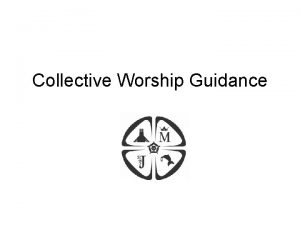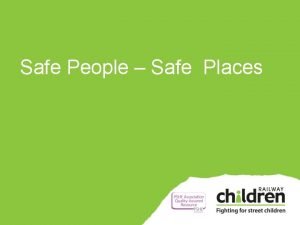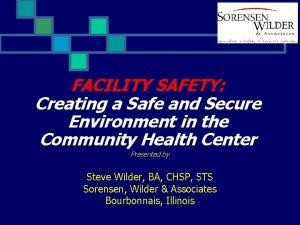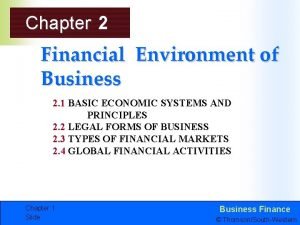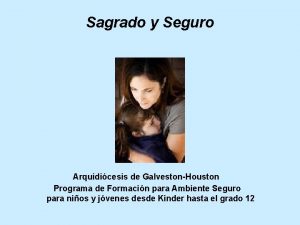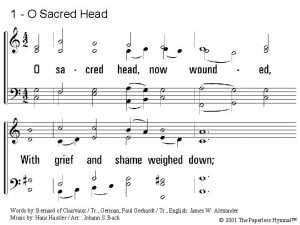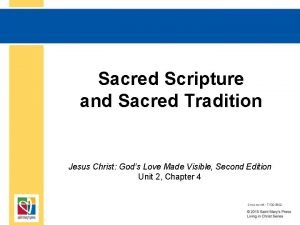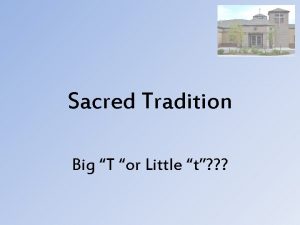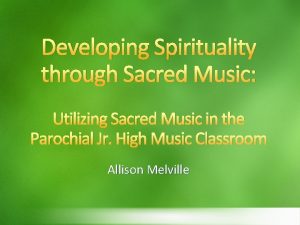Sacred Safe The Archdiocese of GalvestonHouston Safe Environment












































- Slides: 44

Sacred & Safe The Archdiocese of Galveston-Houston Safe Environment Formation Program for Children & Youth in Grades K-12

History & Rationale for Sacred & Safe • USCCB Charter for the Protection of Children and Young People, 2002: ARTICLE 12. Dioceses/eparchies are to maintain “safe environment” programs which the diocesan/eparchial bishop deems to be in accord with Catholic moral principles. They are to be conducted cooperatively with parents, civil authorities, educators, and community organizations to provide education and training for children, youth, parents, ministers, educators, volunteers, and others about ways to make and maintain a safe environment for children and young people.

Archdiocesan response • In 2003, VIRTUS - a safe environment program for all adults, 18+ years old, maintaining regular contact with children in our parishes/Catholic schools; provides adults with the tools to maintain a safe environment and help protect children from sexual abuse. • 2010, Jeremiah 1: 7 - a program for high school age youth who regularly assist adults ministering to children under the age of 18; provides high school age youth with age appropriate knowledge and skills needed to foster a safe environment with the children whom they serve. • 2011, Sacred & Safe - a program which provides faith-based safe environment lessons for children and youth in K-12 th grades. Includes one grade-specific lesson each year to help children and youth develop the skills to protect themselves from sexual abuse.

A Human Response – A Christian Response • Discussing sexual abuse often makes people feel uncomfortable. It touches that which damages the very essence of the dignity and sacredness of the human person. • Helping the most vulnerable is at the heart of the Christian mission (John 25: 40)


Safe & Sacred • A directive from Cardinal Di. Nardo for all parishes to implement this program

Sacred & Safe: A faith-based perspective • God created the human person as good and holy • God loves people and wants them to be safe and feel secure • Every person has the right and responsibility to care for themselves • Words and touch can be loving or harmful • God wants people to make loving choices • Children can learn to distinguish between persons who provide a genuine sense of safety and those who want to sexually abuse them through trickery • Children can learn to distinguish between loving and harmful words and touch • Children can learn how to protect themselves from sexual abuse • Love is experienced in the context of the family and community of faith

Prayer Leader: Our Creator lovingly made each of us in His image and likeness. We are all adopted children of God in Jesus Christ. We are called to celebrate this goodness by treating one another with respect. God wants us to be free from fear and harm. God calls us as children of the Light to care for ourselves and for the least of His people, especially children and the most vulnerable among us. God calls us to be vigilant from the darkness that would rob human beings of their full dignity especially those who would sexually abuse others. Let us listen to God’s Word as we are reminded of who we are and what we are called to do.

Prayer Reader: Ephesians 5: 6 -14 Let no one deceive you with empty arguments, for because of these things the wrath of God is coming upon the disobedient. So do not be associated with them. For you were once darkness, but now you are light in the Lord. Live as children of light, for light produces every kind of goodness and righteousness and truth. Try to learn what is pleasing to the Lord. Take no part in the fruitless works of darkness; rather expose them, for it is shameful even to mention the things done by them in secret; but everything exposed by the light becomes visible, for everything that becomes visible is light. Therefore, it says: "Awake, O sleeper, and arise from the dead, and Christ will give you light. ”

Prayer Everyone: Lord, God, made in your image, we only want to do what is pleasing to you. Give us the Spirit of wisdom to distinguish between truth and falsehood and the courage and love to speak out when we see injustice. Give us the Spirit of understanding that we might be mindful of the tender hearts of the children and youth that we serve. Help us to have the Spirit of right judgment to know when to confront the injustice of abuse and the Spirit of courage to do so. Let the power of the Holy Spirit strengthen us to be good examples for the young and a loving support for all those who are hurt by sexual abuse. Help us to be beacons of your light so that truth and love might reign supreme. We ask this through Jesus Christ, our Lord. Amen.

Training The objectives of formation include: 1. Examine the reality of sexual abuse and the vulnerability of children and youth to perpetrators of sexual abuse 2. Develop pastoral skills to respond to reports of alleged sexual abuse by children and youth. 3. Provide implementation plan involving parents. 4. Develop a parish plan for reporting attendance to the Safe Environment Office.

Overview on Child Sexual Abuse Prevention Primary objective of Sacred & Safe: that no child ever experience the trauma of sexual abuse; to enable children to experience their true dignity as sons and daughters of God. Target: a shared, concerted effort within the Christian community 1. Parents as Primary Educators 2. Children as learners 3. Church as support Approach: A. Through policies and procedures which foster safe environments for children, and B. Education which provides the necessary skills and resources to safeguard their well-being from sexual abuse.

Reality of Child Sexual Abuse

Statistics of child sexual abuse • • • 95% of victims know their perpetrators 1. 3 million children are sexually abused every year 20% of children under age 8 are sexually abused 1 in 5 children are solicited sexually on the Internet 9 is the median age when child abuse is reported 1 in 4 girls and 1 in 6 boys is sexually abused before the age of 18 An estimated 39 million survivors of childhood sexual abuse exist today in the USA 44% of all rape victims are under the age of 18 50% of teenage rapes go unreported Only 33% of abused 13 -18 years admit to be sexually abused Sexual abuse is an act of violence that effects every gender, race, culture, faith, and socioeconomic class 68% of teen mothers have been sexually abused Statistics from “Beyond the Bruises”, Sherri Mabry Gordon

The faces of child sexual abuse • • Excessive crying Sleep & eating disorders Inability to concentrate; anxiety disorders Role confusion Drugs, alcohol problems Urinary, bowel, genital problems STDs

The faces of child sexual abuse • • Poor self image Inability to form stable relationships Depression Suicide

The faces of child sexual abuse

The faces of child sexual abuse

How Sexual Abuse Happens: A Covert Operation Key Dynamics: • Power • Secrecy • Grooming

Three Tactics of Sexual Perpetrators • Power: control • Secrecy: intimidation, manipulation, fear • Grooming: process of building trust

Warning signs of sexual predators Red Flags Adults who • Prefer the company of children and youth to adults. • Hang out with youth in youth-oriented places, such as coffee shops, malls, etc. • Find ways to spend time alone with a child or youth, especially overnight • Provide gifts, trips, favors, or affection to a specific child/youth or select group of youth. • Hugs, pats, or touches youth more frequently than is appropriate. • Provide items of interest (e. g. video games) to children/youth and invite them to make use of them in private locations • Insist that children/youth share deep personal feelings with him or her.

3 -part approach to protection against sexual abuse Communal support Child Sexual Abuse Prevention Disclosure & prevention skills Healthy (inter)personal formation

3 realms of protection against sexual abuse 1. Communal collaborative effort with parents to help children guard against and respond to attempts at sexual abuse 2. Disclosure & Prevention Skills defeat “secrecy” & empower against abuse 3. Raising a sexually healthy child

Sacred & Safe Lesson Plans Three options: 1. Archdiocese of Galveston-Houston Sacred & Safe, K -12 grade specific lessons 2. Archdiocese of New York Catholic Community: Right, Safe, Good Relationships Sexual Abuse Awareness Training 3. RCL-Benziger Family Life Program, K-8 grade program

Option One Archdiocese of Galveston-Houston Sacred & Safe, K-12 th grade specific lessons Key components: • 1 lesson each year (K-12 th grade) separate from regular catechetical lesson • • Lesson Length: K-8 th (60 min); 9 -12 th (90 min) Faith-based objectives & content Opening & closing prayer Skills for prevention • User-friendly directive lesson • Suggested timeline for each component of the lesson • Handouts for each lesson

Primary Learning Objectives Primary Grades (K-2 nd grades) Objectives: To help children distinguish the difference between good and bad (appropriate or inappropriate) touch. To affirm a child’s right to say no to an adult who makes them feel uncomfortable. 1. Examine kinds of touch and a child’s right to privacy 2. Develop skills to avoid bad touch Middle Grades (3 -5 th grades) Objectives: To help children recognize the lures used by those who sexually victimize children. To offer children strategies for keeping them from being tricked into uncomfortable and dangerous situations 1. Examine people who provide a sense of safety and well-being 2. Identify lures or tricks which manipulate or use people 3. Develop responses to lures or tricks which foster personal safety

Primary Learning Objectives Junior High (6 th-8 th grades) Objective: To help youth recognize lures or tricks by those who sexually victimize others via the anonymity of the Internet. To develop skills to avoid being victimized by internet predators. 1. Maintaining safety awareness when having fun 2. Identify lures or tricks that sexual predators use to harm children 3. Create rules for internet safety High school (9 -12 th grades) Objective: To help teens set appropriate boundaries in their relationships with both adults and peers. To develop skills for addressing situations where boundaries are compromised or violated. 1. Know how to distinguish between healthy and unhealthy characteristics in relationships 2. Recognize how boundaries maintain healthy relationships 3. Develop refusal and assertiveness skills for safeguarding boundaries

Option One Archdiocese of Galveston-Houston Sacred & Safe, K-12 grade specific lessons • Each grade: parent take-home resource to reinforce lesson with practical tips • Always give resource directly to parent • Never give the resource to the child to take home • Language used for anatomy: no explicit mention of genitalia except in parent take-home resource • Language should reflect: private parts or parts of the body covered by a bathing (swim) suit

Option Two Archdiocese of New York Catholic Community: Right, Safe, Good Relationships Key components: • 1 lesson each year (K-12 th grade); Catechist adapts 1 of 4 age appropriate sexual abuse prevention lessons with a theme from the regular catechetical lesson (e. g. The Good Shepherd cares for his flock; the Holy Family’s love; Penance as a sacrament of healing & forgiveness) 4 Faith-based Child Sexual Abuse Prevention Lessons: • Primary (K-2 nd grade) • Middle (3 -5 th grade) • Junior High (6 -8 th grade) • Senior High (9 -12 th grade) • Resource provides correlation between child sexual abuse prevention lesson and grade-specific catechetical themes

Pastoral Care & Legal Issues Responding to children’s disclosure of abuse

Pastoral Care & Legal Issues when responding to children’s disclosure of abuse • Key questions that arise when a child approaches an adult to disclose sexual abuse: 1. What should I do? 2. How do I respond to the child?

When responding to a child’s disclosure, there are three primary goals 1. Protect the child from further abuse 2. Stop the abuser from exploiting or hurting other children 3. Address the child’s symptoms and the harm done to the child and the child’s family

Response Summary • Pastoral: Respond with loving compassion to the child • Legal: Report the disclosure to proper state authorities • Professional: Exercise appropriate internal organization reporting

How to respond to the child? Children Assessment Center (CAC) Summary Catechist Handout 2 Do • • Allow the child to use his/her own words to describe the incident Assure the child he/she is not to blame for what happened Treat the child normally Take care of the child’s emotional needs Listen and take notes Allow the child to talk about the incident if he/she brings it up Write down concerns and questions for CPS, police officers and therapists • Love and support the child

How to respond to the child? Children Assessment Center (CAC) Summary Catechist Handout 2 Don’t • Use your language to help the child describe what happened • Try to interview or investigate • Overreact • Express fear, anger and anxiety • Initiate conversation about the incident • Let personal feelings influence the child • Reward the child for giving information

Legal Response for Reporting Abuse to Texas Legal Authorities Catechist Handout 3 • Texas has a mandatory reporting law stating that any person responsible for a child’s care, custody or welfare who has cause to believe that a child is being abused or neglected must report the crime within 48 hours. Child abuse may be mental, emotional, physical or sexual. Neglect is leaving a child in a situation where they would be exposed to substantial risk of physical or mental harm. Failing to report child abuse and neglect is a Class B misdemeanor in Texas. If you have cause to believe that a child’s physical health, mental health or welfare has been or may be adversely affected by abuse or neglect, you must report the offense. Call the Child Abuse Hotline at 1 -800 -252 - 5400 or call local law enforcement immediately. • To Report Abuse, Call TDFPS at 1 -800 -252 -5400

Procedures in Case of Suspected Child Abuse: Catechist’s Responsibility to Report Suspected Child Abuse - prepared by the Archdiocesan Legal Department Catechist Handout 4 • REPORT … DO NOT INVESTIGATE • When reporting abuse to the hotline, you will be asked to provide the following information: a. Child’s name, age and address. b. Primary caretaker’s name and address. c. Physical indicators observed. Behavioral indicators observed. e. Other indicators observed. f. Your name, position and contact information.

Procedures in Case of Suspected Child Abuse: Catechist’s Responsibility to Report Suspected Child Abuse • After reporting the information, ask for a case reference number (proof report has been made). Soon after the call, write a narrative description of your report + the reference number (needed by the Archdiocese when there is an on-site investigation) • Keep Confidential: your suspicion and reporting (it is reasonable to advise the pastor, DRE, DYM); it is reasonable for them to inform other personnel who have contact with the victim. Beyond that, do not disclose to other catechists, the child’s family, your family, friends, etc. • Investigation: The Pastor or other appropriate parish personnel are responsible for verifying credentials of on-site investigators and examining in touch with the Archdiocesan Legal department. Please review additional information regarding parish on-site investigations.

How Children’s Protective Services (CPS) responds to reports of abuse Catechist Handout 5 Frequently Asked Questions (FAQs) 1. I have heard reporting abuse to CPS can sometimes makes matters worse? 2. After I report abuse, how does CPS respond? 3. How do professionals assist the child and the family of the child who has been abused?

Documentation & Reporting Attendance • All documentation and reporting of program attendance is between the local parish contact and the Safe Environment Office manager

PCL/Catechist Closing Prayer Leader: God’s love for us is unconditional. God has called you to be leaders and teachers of his love through word and action. Let us listen to God’s Word. (Reader): Philippians 4: 4 -9, 13 Rejoice in the Lord always. I shall say it again: rejoice! Your kindness should be known to all. The Lord is near. Have no anxiety at all, but in everything, by prayer and petition, with thanksgiving, make your requests known to God. Then the peace of God that surpasses all understanding will guard your hearts and minds in Christ Jesus.

PCL/Catechist Closing Prayer Finally, brothers, whatever is true, whatever is honorable, whatever is just, whatever is pure, whatever is lovely, whatever is gracious, if there is any excellence and if there is anything worthy of praise, think about these things. Keep on doing what you have learned and received and heard and seen in me. Then the God of peace will be with you. I have the strength for everything through him (Christ) who empowers me. Everyone: Lord, Jesus, as parish catechetical leaders and catechists, we pledge to faithfully care for the young people entrusted to our care through our words and actions. Strengthen us through the Holy Spirit with the gifts of knowledge, courage, and right judgment that we might protect and guide them so that they might experience your promise of abundant life. Protect them, their parents, and their families from all evil. We ask this through Jesus Christ. Amen.

Acknowledgments The Offices of Continuing Christian Education, Youth Ministry, and Safe Environment would like to thank the following persons for their involvement and contributions in the planning and development of this effort: Archdiocesan Steering Committee for Safe Environment Formation • Jim Barrette, Secretariat Director for Pastoral and Educational Ministries • Anne Comeaux, Director, CCE Office • Brian Johnson, Director, OYM • Norma Torok, Associate Director, OYM • Mark Ciesielski, Associate Director, CCE/OYM • Julie Blevins, Manager Safe Environment Office • Sally Leonard, Past Manager Safe Environment Office

Acknowledgements Writers of Safe & Sacred Lessons: • • Gabriela De. Pavia & Waldemar Karaszewski Mary Wright Nannette Coons Marty Matulia • Sacred & Safe Spanish translator: Gabriela De. Pavia • Technical Assistant: Brian Garcia-Luense • Archdiocesan Sacred & Safe Website Designer: Paige Tomas Contributors of resources: • The Archdiocese of New York • The Children’s Assessment Center, Houston, Texas • The Global Children’s Fund. Keep. Your. Child. Safe. org
 Archbalt.powerschool
Archbalt.powerschool Archdiocese of liverpool
Archdiocese of liverpool Archdiocese of liverpool
Archdiocese of liverpool Safe feed safe food
Safe feed safe food Safe people safe places
Safe people safe places Safe and secure environment
Safe and secure environment Financial environment of business
Financial environment of business Khi nào hổ mẹ dạy hổ con săn mồi
Khi nào hổ mẹ dạy hổ con săn mồi Thiếu nhi thế giới liên hoan
Thiếu nhi thế giới liên hoan Chúa yêu trần thế alleluia
Chúa yêu trần thế alleluia điện thế nghỉ
điện thế nghỉ Một số thể thơ truyền thống
Một số thể thơ truyền thống Trời xanh đây là của chúng ta thể thơ
Trời xanh đây là của chúng ta thể thơ So nguyen to
So nguyen to đặc điểm cơ thể của người tối cổ
đặc điểm cơ thể của người tối cổ Tỉ lệ cơ thể trẻ em
Tỉ lệ cơ thể trẻ em Vẽ hình chiếu vuông góc của vật thể sau
Vẽ hình chiếu vuông góc của vật thể sau Các châu lục và đại dương trên thế giới
Các châu lục và đại dương trên thế giới Thế nào là hệ số cao nhất
Thế nào là hệ số cao nhất ưu thế lai là gì
ưu thế lai là gì Hệ hô hấp
Hệ hô hấp Tư thế ngồi viết
Tư thế ngồi viết Môn thể thao bắt đầu bằng chữ đua
Môn thể thao bắt đầu bằng chữ đua Hát kết hợp bộ gõ cơ thể
Hát kết hợp bộ gõ cơ thể Cái miệng nó xinh thế
Cái miệng nó xinh thế Mật thư tọa độ 5x5
Mật thư tọa độ 5x5 Tư thế ngồi viết
Tư thế ngồi viết Voi kéo gỗ như thế nào
Voi kéo gỗ như thế nào Thẻ vin
Thẻ vin Thể thơ truyền thống
Thể thơ truyền thống Các châu lục và đại dương trên thế giới
Các châu lục và đại dương trên thế giới Khi nào hổ con có thể sống độc lập
Khi nào hổ con có thể sống độc lập Từ ngữ thể hiện lòng nhân hậu
Từ ngữ thể hiện lòng nhân hậu Diễn thế sinh thái là
Diễn thế sinh thái là Thứ tự các dấu thăng giáng ở hóa biểu
Thứ tự các dấu thăng giáng ở hóa biểu Vẽ hình chiếu vuông góc của vật thể sau
Vẽ hình chiếu vuông góc của vật thể sau Làm thế nào để 102-1=99
Làm thế nào để 102-1=99 Lời thề hippocrates
Lời thề hippocrates Chụp phim tư thế worms-breton
Chụp phim tư thế worms-breton đại từ thay thế
đại từ thay thế Quá trình desamine hóa có thể tạo ra
Quá trình desamine hóa có thể tạo ra Công của trọng lực
Công của trọng lực Thế nào là mạng điện lắp đặt kiểu nổi
Thế nào là mạng điện lắp đặt kiểu nổi Các loại đột biến cấu trúc nhiễm sắc thể
Các loại đột biến cấu trúc nhiễm sắc thể

